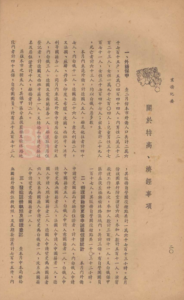Shanghai has been a cosmopolitan city for a very long period. After the First Opium War, the British forces exerted influence over the city’s operations,2 and the signning of the Treaty of Nanking elevated Shanghai to a significant treaty port in China.3 Throughout the Republican era, Shanghai boasted numerous international settlements, attracting a sizable foreign population engaged in trade, migration, or seeking refuge.4 This dynamic transformed Shanghai into a city where diverse cultures, powers, and foreign identities intermingled. Among the various forces and identities present, the police forces emerged as particularly complex institutions, highlighting the intricacies of Shanghai’s societal landscape. In this week’s assigned reading, Frederic Wakeman Jr. posits that this complexity underscores Shanghai’s ties to the imperial network,5 as all four police agencies operating in the city during that time were linked to imperialism or colonialism:
- The International Settlement’s Shanghai Municipal Police
- Frenchtown’s Concession Police
- The Nationalist Garrison Command’s Military Police
- The Chinese Special Municipality’s Public Safety Bureau
Nevertheless, this blog, in another way intends to discuss the diverse police forces in Shanghai in 1945, based on the texts from one of the volumes of Jingcha Yuekan 警察月刊 published in 1945 in Shanghai, to contend that Shanghai, at least in the aspect of police forces, represented a little globe. Specifically, it was a city showcasing the international coexistence of various countries, rather than solely being a treaty port city within the imperial network.
In one of the volumes of Jingcha Yuekan 警察月刊 published in 1945, a text titled Waiji Baojia 外籍保甲 provides a concise overview of the foreign police forces in Shanghai during that year. According to the text, in 1945, there were 26,715 foreign households in Shanghai, including nationalities such as Poland, Spain, Germany, Greece, and White Russia, among others.6 This detailed enumeration highlights the Chinese police’s awareness of the growing presence of foreigners, necessitating specific record-keeping. Furthermore, the text includes information on marriages and departures of foreigners. In February 1945, for instance, one German and one Spanish individual left Shanghai, while ten others became residents due to marriage.6 Additionally, two individuals underwent divorce proceedings.7 These reports indicate that the Chinese Shanghai police force was not only focused on local criminal matters but also actively monitored the living situations of foreigners. Managing the experiences of foreign residents was evidently within the purview of the Chinese Shanghai police forces, reflecting an international exchange of information. At this juncture, the foreign residents were not a manifestation of imperialism but rather constituents of Shanghai as a miniature globe.
However, despite the Chinese police force noticing and recording the presence of foreign groups in Shanghai, it does not imply a managing-and-being-managed relationship between these foreigners and the Chinese police force. Instead, I argue that the primary text reveals Shanghai’s dynamic situation, which rendered it a little globe. While the Chinese police force documented the details of foreign residents, they were not involved in their management. According to the text, foreigners had their own established Baojia Dui 保甲队, responsible for securing of specific groups and conducting defence drills within their settlements. For instance, the text highlights that Jewish people had 45 Baojia 保甲, collectively serving as a police force for 16,713 hours in February.7 Moreover, in the same month, the Jewish police force conducted six air defence drills involving 511 individuals.7 Similarly, White Russians had three Baojia 保甲, serving for 1,032 hours in February.7 Evidently, foreign groups operated under their own orders and regulations regarding policing. At this juncture, the Chinese police force merely acted as record-keepers rather than active participants or managers. Although foreigners were residents of Shanghai under the supervision of the Chinese police force, these foreign groups operated independently of the Chinese police force system. Within Shanghai’s city space, these groups functioned as autonomous institutions. This arrangement contributed to the creation of a little globe in Shanghai that lacked a centralised management.
Frederic Wakeman Jr. argues that Shanghai’s complicated police systems during the time highlighted its role in the imperial network. However, my contention in this blog is that Chinese and foreigners in Shanghai occupied independent statuses individually. Spatially, Shanghai resembled a collection of many small states and nations, with the Chinese lacking dominant status. This situation resulted in Shanghai being characterised as a miniature globe during this era.
- “Waiji Baojiao” 外籍保甲, Jingcha Yuekan 警察月刊 1.2 (1945): 20. [↩]
- Robert S. Rait, The Life and Campaigns of Hugh First Viscount Gough, Field-Marshal (London, 1903), p. 268. [↩]
- ‘The Opium War (or How Hong Kong Began)’, South China Morning Post, 24 July, 2011, <https://www.scmp.com/article/974360/opium-war-or-how-hong-kong-began> [accessed 11 March 2024] [↩]
- Frederic Wakeman, ‘Policing Modern Shanghai’, The China Quarterly 115 (September 1988): p. 427, <https://doi.org/10.1017/s0305741000027508> [accessed 11 March 2024] [↩]
- Wakeman, ‘Policing Modern Shanghai’, p. 412.] [↩]
- “Waiji Baojiao” 外籍保甲, p. 20. [↩] [↩]
- Ibid. [↩] [↩] [↩] [↩]
